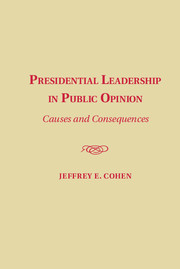Description
Presidential Leadership in Public Opinion
Causes and Consequences
Author: Cohen Jeffrey E.
This book looks at the factors that affect voters' perceptions of the president, presidential approval ratings, attitudes about Congress, and voter trust toward government.
Language: English
Subject for Presidential Leadership in Public Opinion:
Presidential Leadership in Public Opinion
Publication date: 04-2015
222 p. · 15.2x23 cm · Paperback
Publication date: 04-2015
222 p. · 15.2x23 cm · Paperback
Approximative price 92.79 €
In Print (Delivery period: 14 days).
Add to cart
Presidential Leadership in Public Opinion
Publication date: 04-2015
222 p. · 15.7x23.5 cm · Hardback
Publication date: 04-2015
222 p. · 15.7x23.5 cm · Hardback
Description
/li>Contents
/li>Biography
/li>
Although presidents may have a difficult time actually leading the public and Congress, voters still desire strong leadership from their commander in chief. In Presidential Leadership in Public Opinion, Jeffrey E. Cohen argues that the perception of presidential leadership in American politics is affected not so much by what presidents accomplish but by whether voters think their president is a good leader. When assessing whether a president is a good leader, voters ask two questions: does the president represent me and the nation? And, is the president strong? Cohen shows that presidential interactions with Congress affect voter perceptions of presidential representation and strength. These perceptions have important implications for public attitudes about American politics. They affect presidential approval ratings, the performance of candidates in presidential elections, attitudes toward Congress, and trust in government. Perceptions of presidential leadership qualities have implications not only for the presidency but also for the larger political system.
1. The many meanings of presidential leadership; 2. Evidence on the public demand for presidential leadership; 3. Congressional sources of the president's leadership image; 4. Success in Congress and perceptions of presidential strength; 5. Presidential representation and public opinion; 6. Presidential leadership and presidential elections; 7. Perceptions of presidential leadership, trust in government, and attitudes toward Congress; 8. Presidential leadership, public opinion, and American democracy.
Jeffrey E. Cohen is a Professor of Political Science at Fordham University. Cohen is the author of thirteen other books. His last book, Going Local: Presidential Leadership in the Post-Broadcast Age (Cambridge University Press, 2010) won both the 2011 Richard E. Neustadt Award from the Presidency Research Group of the American Political Science Association and the 2012 Goldsmith Award from the Joan Shorenstein Center on the Press, Politics and Public Policy, John F. Kennedy School of Government, Harvard University. He is the author of more than fifty articles in academic journals such as the American Political Science Review, the American Journal of Political Science, and the Journal of Politics.
© 2024 LAVOISIER S.A.S.




